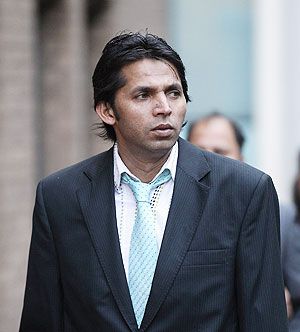Following the footsteps of his fellow banned teammates, disgraced Pakistan pace bowler Mohammad Asif also admitted to spot fixing during a meeting with Subhan Ahmad, the Chief Operating Officer of the Pakistan Cricket Board in Lahore.
A top source in the PCB said that Asif met Ahmad and confessed that he had indulged in spot fixing during the fourth Test against England at Lords in 2010.
- Coverage: Spot-fixing trial of Pakistan players
"He [Asif] said he was ashamed of what he had done and his conscience had been troubling him for the last many months but he was scared to speak out the truth," the source said on Thursday.
"Asif said he finally gathered courage to admit his guilt as he wanted to revive his cricketing career and also salvage his image," the source added.
Asif, along with Salman Butt and Muhammad Amir, was banned in early 2011 for a minimum of five years on spot fixing charges. The trio also served jail sentences for corruption and cheating. Both Salman, who was the captain of the team when the spot-fixing scandal broke out, and Amir had confessed to their wrong doings earlier and apologised to the nation.
Both Salman, who was the captain of the team when the spot-fixing scandal broke out, and Amir had confessed to their wrong doings earlier and apologised to the nation.
Asif said he is willing to cooperate with the International Cricket Council (ICC) and PCB completely, and undergo a rehabilitation program.
"He said he was ashamed and that he apologised to the entire nation and his fans for his mistakes," the source said.
"It is a good thing that Asif has also admitted to his guilt and the PCB will now try to start rehabilitation programs for Butt and Asif as soon as possible," he added.
The PCB has already requested the ICC to review Amir's ban and allow him to use the Board's training facilities and also take part in some club cricket so that he is ready to play competitive cricket again when his ban ends in 2015.
Asif has remained the most controversial figure among the banned players and has also been found guilty of failing a dope test, carrying marijuana and other problems in the past.
Photograph: Oli Scarff/Getty Images












 © 2025
© 2025